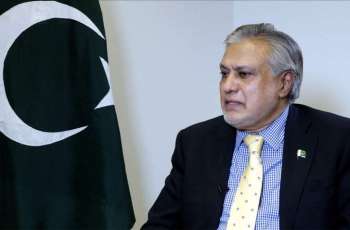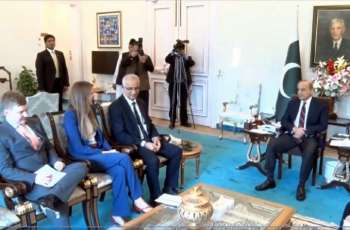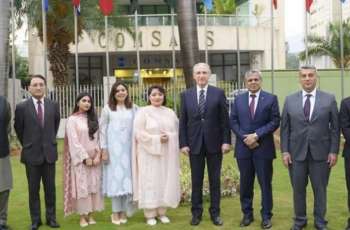Experts on Thursday urged healthy people to donate blood voluntarily on regular basis to save the lives of over 100,000 Thalassaemia patients in the country and 5000 babies, which born every year with the deadly disease
Dr. Saeed Ahmad Ali:
Experts on Thursday urged healthy people to donate blood voluntarily on regular basis to save the lives of over 100,000 Thalassaemia patients in the country and 5000 babies, which born every year with the deadly disease.
They appealed to people that every single drop of blood could save precious lives, urging the youth to take an active part in the awareness campaigns through the social media forums for protecting humanity.
These patients need regular blood transfusion and iron chelation after consultation with a qualified hematologist, along with regular diagnostic investigations on a monthly basis, which is unaffordable for the poor families in they country, they said.
In Pakistan, approximately over 100,000 patients are suffering from Thalassemia currently, and every year, 5,000 babies are born with the deadly disease, revealed a report, released by the Pakistan Thalassemia Centre (PTC) recently.
The Pakistan Bureau of Statistics document shows that the share of children in the total population of the country from 2009 to 2018 is 35 per cent in the age group of 0-14 years. Similarly, Pakistan Demographic and Health Survey (PDHS) report shows that one in every 14 children dies before reaching their first birthday, and similarly one in every 11 children dies before reaching their fifth birthday. The document further highlights that among other diseases, an estimated 5,000 children with Beta (ß-Thalassemia) are born every year. This number is 5 to 8 per cent among a 9.8 million total ‘carriers’ of the country’s population, it calculated.
Medical Director Sundas Foundation Dr Adnan Gilani said that beta Thalassemia among children was a ‘major’ and one of the most severe forms of blood disorders. He said that during blood shortage, such patients face serious life threats, as blood makes only a few healthy red blood cells which even do not ensure a life cycle for a long time.
This disorder is passed from parents to children through genetic inheritance, and as a result, the red blood cells do not produce protein and enough hemoglobin, which supplies oxygen throughout the body, he added.
To a query, Dr. Gilani said that children with Thalassemia suffer from severe medical complications, including life-long blood transfusions.
Following the government appeal to save the precious' lives of the Thalassemia children, the Sundas Foundation, along with some other associations, organised different blood donation camps including one at the Governor’s House, in which the general public, students of various institutions, Hall Road traders, Punjab Police personnel and religious quarters donated more than 265 blood pints, Dr. Adnan said.
Around 12,000 blood pints are collected in the form of donations annually across the Punjab province, he added.
Chief Executive Officer (CEO) Pakistan Sweet Home and President Allied Health Professional Council of Pakistan Zamurrad Khan (Hilal-e-Imtiaz) said: “This day is specified to mark as a day to pay tribute to the heroes, who donate blood regularly for saving precious lives.” Talking to APP at a ceremony, held in connection with the Blood Donation Day on June 14, he said that donating blood was the greatest act, adding that people as good as in Pakistan are not found anywhere in the whole world. "Pakistani people are lively and do not hesitate to make any sacrifice. What can be a better example than this that we started the mission of saving innocent lives two years ago on the same day i.e., June 14," he recalled.
Punjab health ministry official sources told APP that the present government had decided to initiate a school health screening project, which would be a hallmark in the health sector, and prove to be a historic and game-changer initiative.
Sources said that the screening programme would help protect the present and future generations from dangerous diseases in the province, adding that for the first time in the history of Pakistan, children were going to be screened on such a large scale. But within the limited resources and prevailing circumstances of health challenges, the government has taken unprecedented measures to ensure smooth delivery of blood to the patients at various centers, he added.
Soon after sensing the gravity of the situation, the government has taken prompt measures to help resolve the issue on a priority basis by directing the departments, health forums, and social organisations concerned to launch a campaign for blood donations to overcome the blood shortage for Thalassemia centres.
Mian Nasir Ali, an elderly social worker, said that collecting blood donations daily for children battling Thalassemia, Haemophilia, and blood cancer diseases and providing free quality blood to deserving patients was indeed a great work.
The International Thalassemia Day was observed on May 8, and this year the theme of the day was “Be Aware, Share, Care: Strengthening education to Bridge the Thalassemia Care Gap.’’ The International Thalassemia Day was dedicated to Thalassemia patients, battling the disease and remember those who have passed away due to this disease.



